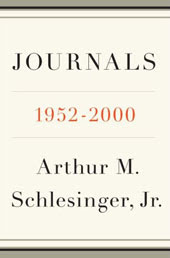
The Guardian happens to be reading what I'm reading: Niall Ferguson's The Ascent of Money. Just published in Britain evidently, whereas I waited about six months for it on the Toronto Public Library wait list (450th when I started on it). Haven't read enough to offer my own response yet, but the British cover (click the link) is more fun than the North American one I have.
Recently found myself, by mere accident, dipping into Journals 1952-2000 by Arthur M. Schlesinger, Jr. And found them amazingly interesting. Here was a historian who had intimate lunches, dinners, and cocktail parties (late in life he sees the advent of white wine and Perrier as a harbinger of the collapse of civilization), with absolutely everyone in liberal, north-eastern American circles of power for fifty years. Not just all the Kennedys, and every Democratic presidential contender, but Kissinger, and Lauren Bacall, and Adolph Green and Betty Comden, and Norman Mailer, even Bianca Jagger. Then he went home and wrote it down in his diary. Not particularly salaciously -- he's not the guy for Kennedy dirt -- but always vivid and thoughtful. He's an absolute liberal -- he finds Jimmy Carter insufficiently liberal and becomes so partisan about it he thinks of voting for Reagan, who he expects to be a harmless dunce. Then he notes George McGovern, similarly at odds with the Carter presidency, admitting he voted for Gerald Ford over Carter. He will think well of almost anyone (Margaret Thatcher, Pat Buchanan) who is good company at a dinner. His one enduring hatred is for Dick Nixon -- and then Nixon moves into the house across his back fence. (Hilarity ensues.)
Schlesinger knew lots of the academics, too. He's interesting on the experience of a historian who more or less abandoned the university for public life (tho' indeed he taught all his life, and he published a lot more history than most of those he left behind.):
"My academic friends are mostly those like Ken Galbraith and Dick Wade, for whom academic life is also a means rather than an end. The historians with whom I feel intense sympathy are those like George Bancroft and Henry Adams who abandoned academic life for the world of affairs."One sad motif in the later pages -- he keeps trying to find time to get down to the fourth volume of his Age of Roosevelt. It never appeared. I wonder what Niall Ferguson says about that kind of thing in his journal.
Update June 16: Ferguson's Ascent of Money? I don't think I'm going to get too far with it. You know how films get novelized? Maybe this is the equivalent for his television documentary. Seems pretentious to find a history of finance a bit... trivial, but there we are.